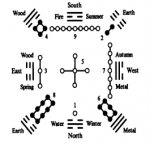Clarity,
Office 17622,
PO Box 6945,
London.
W1A 6US
United Kingdom
Phone/ Voicemail:
+44 (0)20 3287 3053 (UK)
+1 (561) 459-4758 (US).


'Shock comes bringing danger.
A hundred thousand times
You lose your treasures
And must climb the nine hills.
Do not go in pursuit of them.
After seven days you will get them back again.
To not give chase (means) seven days to gain.
I view the ache, which I acknowledge, as angst, and angst is always a choice, or a matter of self-control or mind-control or control of emotions. Not always easy though, and in fact sometimes very difficult
The most vivid experience, without going into detail, which I did once before concerning this line, was an argument over religion. I could find evidence to substantiate my position, but he could find evidence to refute my claim. We were both pretty excited and sure of our own positions. That's what happens with exclusively self-referencing material, such as the Bible. Always contradictions can be found, never ending mounds to climb; hence why I think Sven's example of Sisyphus' task of pushing a boulder up a mountain, only to see it roll down again - again, just a metaphor for futility - is apropos. Religious arguments are typically that way. Wherever ones personal faith is invested, there's the sense of a treasure that one must defend and hold onto. But ones real treasure is their sensibility, and that flies out the window when one gets all worked up over their beliefs. But not giving chase means not trying to prove ones point when it's absurd to pursue what is a circular argument that you just can't win.
When this fellow and I got back together again, we just agreed to disagree and get on with things we shared in common. Neither of us felt like getting all worked up over nothing.
Now, I respect that your experiences were different, but I can't deny my own. It's funny how discussions about a certain hexagram or line seems to take on the very nature of that hexagram or line.
Wilhelm, Bradford and LiSe (and I'm sure others) also use the number 100,000 in their 51.2 text. Does anyone really believe that's intended to be taken literally?
Whether using mounds, peaks, boulders, cowrie shells, time, or thunder itself, we're dealing with metaphor, which is merely a figure of speech to express an idea. The real question is, which idea?
The fact that more than one authority claims to know the meaning of a given metaphor does not make that meaning infallible and irrefutable. Or if it is irrefutable, so should the evidence to prove it also be.
I've merely presented my idea based on my personal experience with the line; nothing less, nothing more. I've said before that I may be mistaken. I'm still open to discussion on the matter, but I'm not interested in arguing.
what is it really, climb the nine hills, a name of a book and what it has to do with hexagram
Clarity,
Office 17622,
PO Box 6945,
London.
W1A 6US
United Kingdom
Phone/ Voicemail:
+44 (0)20 3287 3053 (UK)
+1 (561) 459-4758 (US).